|
By Colonel_Klink - 5 Years Ago
|
Recently I received a copy of "Professional Storyboarding: Rules of Thumb". Among my daily schedule I'm typing up the screenplay for a project that was put aside when I was diagnosed with throat cancer.
I have dabbled with storyboarding off and on over the years, and although I can sketch I'm no Da Vinci. A few years ago I toyed with the idea of creating a visual novel ( another of those started ideas that have been superseded by another, but I digress). Anyway the book has renewed my enthusiasm to finish a project, at least, before leaving this mortal coil. Below is the beginning of that visual novel using a mixture of real-life scenes and iClone characters to see what I could produce. The last three frames are there to show the development from a photo of a real building with one of the main characters composited over it. The 'comic' effect was done with a filter in Photoshop. There is probably easier ways to do this, but one has to experiment...
Anyway I'd be interested in my fellow iCloners thoughts and experiences with storyboarding.
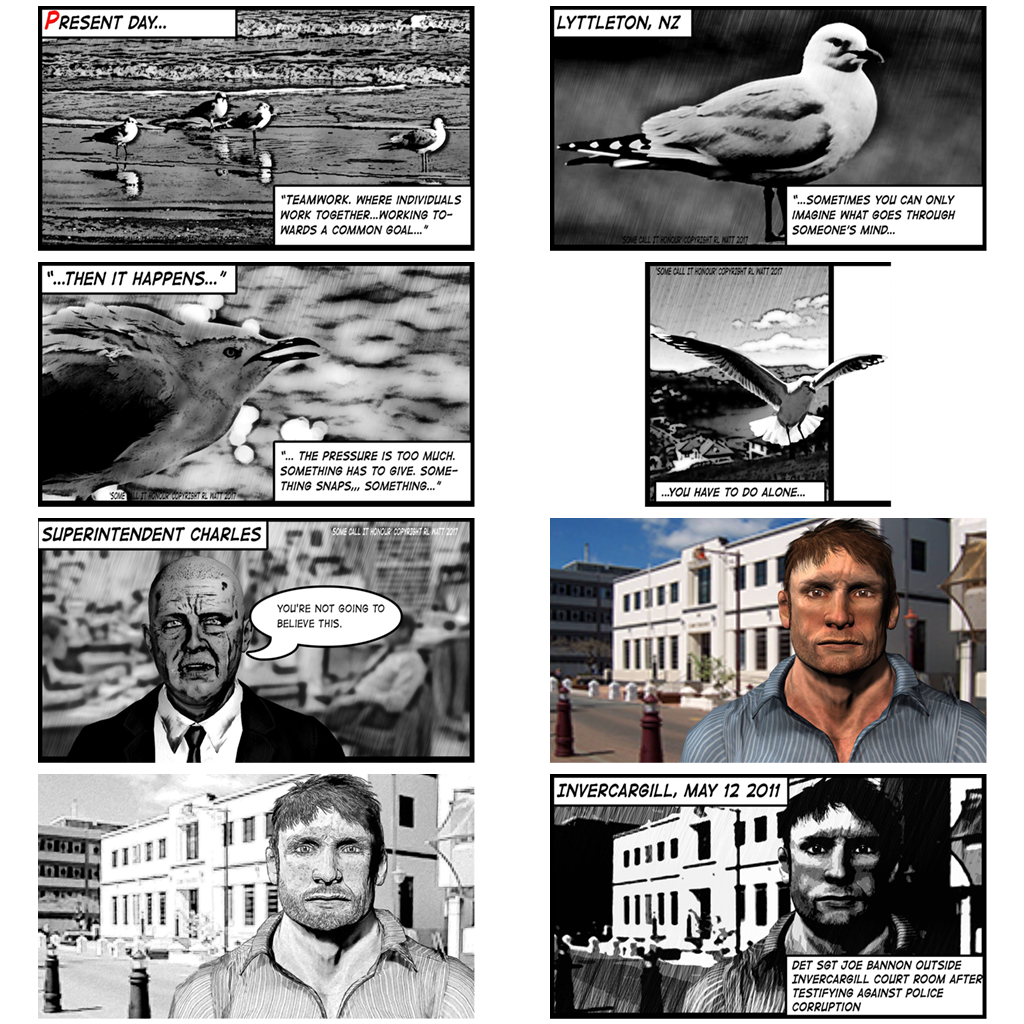
|
|
By planetstardragon - 5 Years Ago
|
nice work on that story board strip, I've usually seen them horizontally to emulate a timeline on a video editor ...which helps with visualizing the pacing the timing of your movie.
I don't story board, but this is also because I'm a one man show running my Music Label - it's a lot of work and I'm limited not only on time, but creatively it takes it's toll on you when you are constantly having to be creative in a variety of disciplines - ie - sound design, composing, mixing, mastering, artwork ...each one of those have their own brand of creativity and it can get exhausting jumping from one to another constantly, because each form of creativity is attached to some form of technicality. so it's not as easy as just making stuff up when part of that creativity is knowing what tools to use to achieve your goals.
What I usually do for music videos is keep my animation software up and video editor and just go with the flow - which kind of melds all disciplines into a form of free flowing creativity - no pausing to think of what software to use or what scene to shoot next, the software is up, you are listening to music and creating scenes as you go.
I do have some scripts that I've come up with though that I'd like to eventually do for film festivals which will require a story board to accomplish - I've touched on the subject and one app that I found interesting for this is https://trello.com/home this system has a way of organizing data for team driven projects, or even working solo that lets you attach a variety of files / links and information that let you post an image from a storyboard, and give details on what software to use, provide updates and share workloads with teams. - so for example, you attach one picture - people can add feedback, post links of related images for a color theme, or add links and details of the tools and softwares to use to achieve that shot
The workflow I envisioned for trello is as follows -
master image with Movie poster draft - to rep the Entire Project -
1st sub topic, storyboard - with a cap of the entire storyboard
subtopic under storyboard - 1 Image from storyboard ...
group discussions about lighting, texturing, prop sourcing, software to use etc...
and finally a link to the final render for the editor.
other sub - topics can be made on funding, marketing ...etc - it's very cool tool that can really organize your project in great detail with a "creative" approach lol
|
|
By animagic - 5 Years Ago
|
A while ago I began a storyboard for one of my yet unmade movies, by indeed drawing everything, but I didn't like the stick figure characters, so I started to use iClone for that. I converted the renders to drawings and then hand-drew to that.
Now, I rather build the scenes as I go along with writing the screenplay, using iClone as a design tool.
Like PSD, I have to do everything myself, so a storyboard is an extra step. Other than for very short movies, I do write a screenplay.
Since making a movie takes a long time, I have been playing with the idea of creating a graphic novel based on the material that I already have. Sort of animation without animating. I'm also a bit stuck at this point, so I hope it will inspire me.
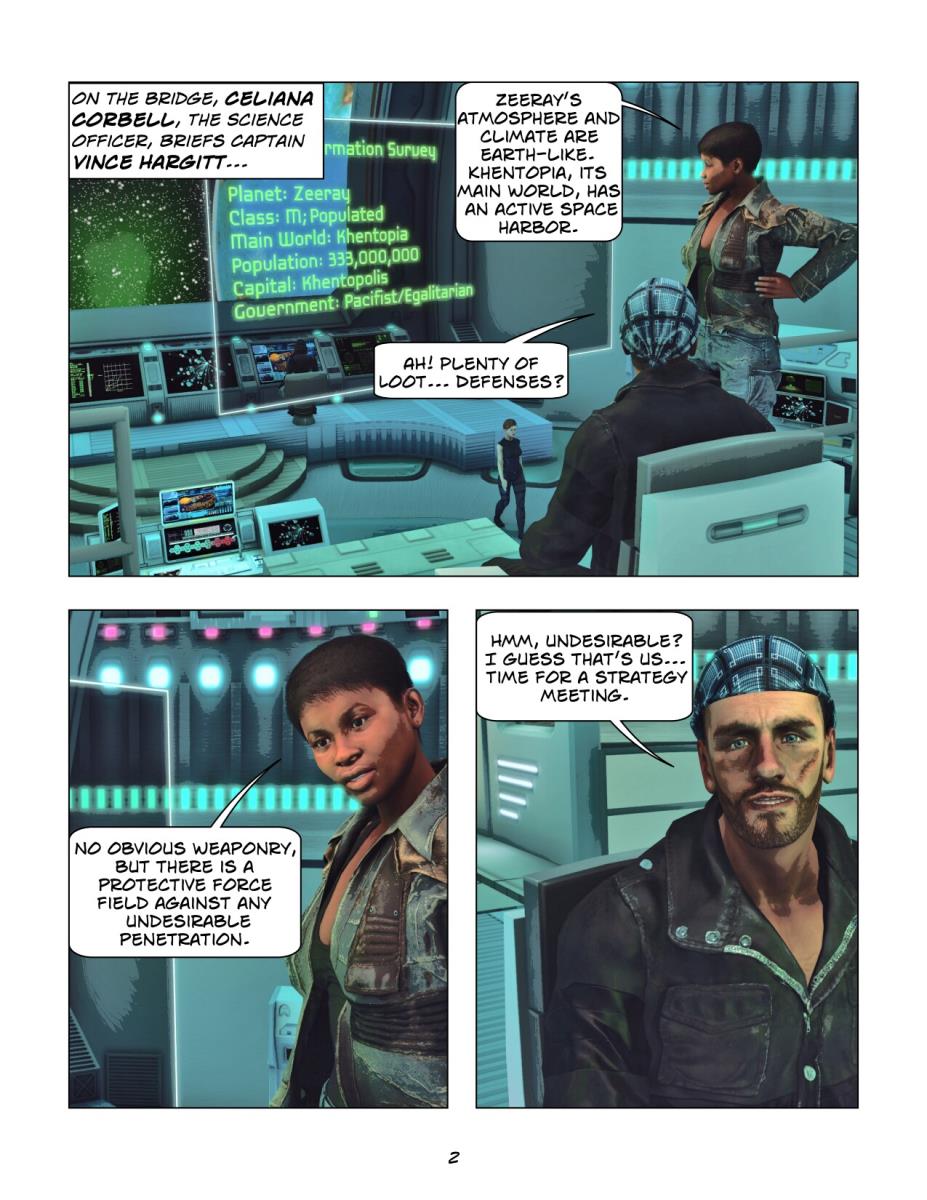
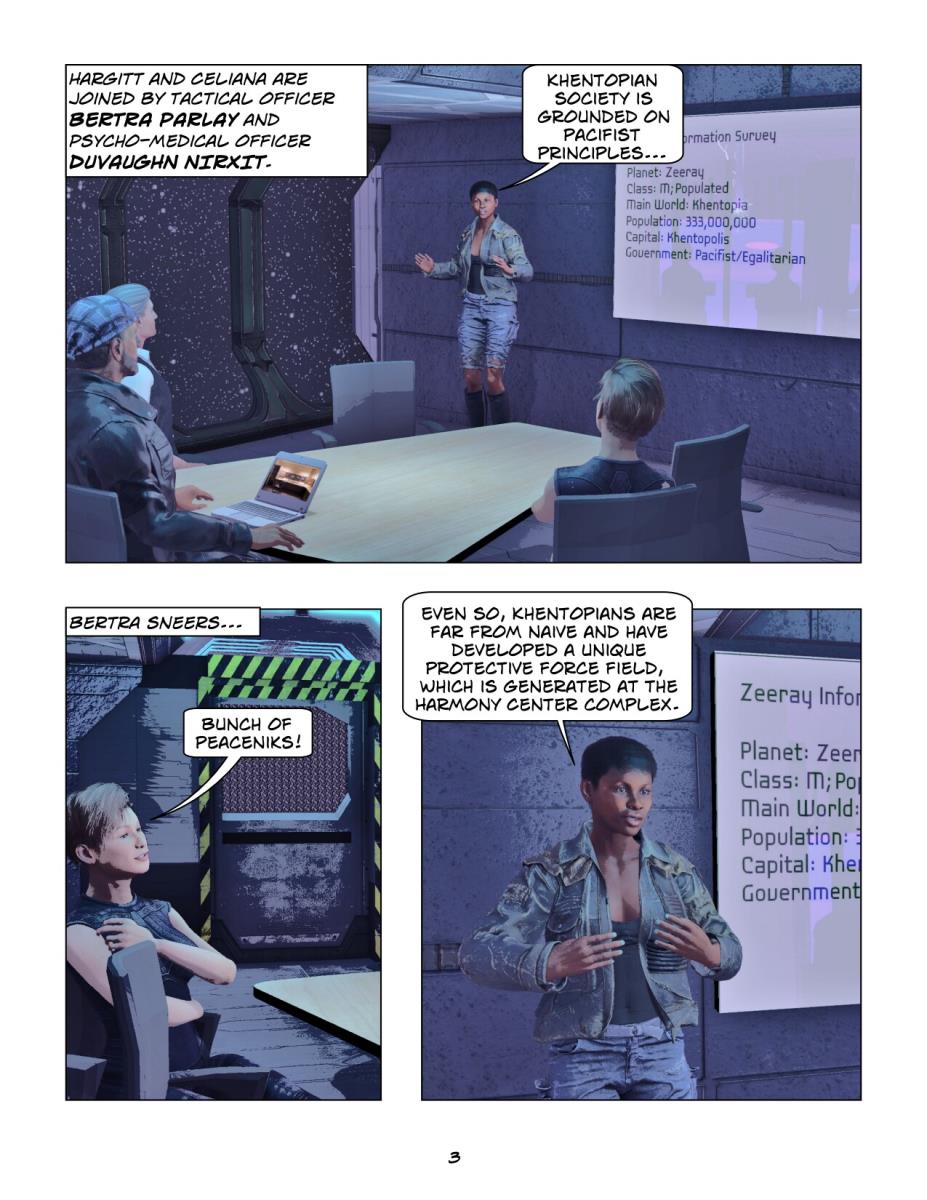
I have created a Paint Shop Pro script that converts renders into something more comic-like. I then use the Comic Life software to put it together.
|
|
By planetstardragon - 5 Years Ago
|
wow, that's amazing work Animagic!! - might be fun to turn that into a motion comic, there are many styles of motion comics too, some are just close ups and pans of the scenes with narration behind them - which are very impactful!! Great work, totally different than anything I've seen you create before and looks great!!
|
|
By thebiz.movies - 5 Years Ago
|
|
I have story-boarded particular scenes while writing some of the few scripts I've worked on but its generally just me jotting down specific visual cues and ideas I'm having while writing the scene for memory sake. Usually just some hand drawn sketches on the sides of the script.
|
|
By charly Rama - 5 Years Ago
|
|
for a good storytelling, the storyboard is essential, this allows a global vision of the story, to choose the angles of view and the camera work so that the spectator is immersed in the story. I could not make a movie or clip without storyboard
Animagic, excellent comic strip you've made there
|
|
By Cary B - 5 Years Ago
|
|
thebiz.movies (1/24/2020)
I have story-boarded particular scenes while writing some of the few scripts I've worked on but its generally just me jotting down specific visual cues and ideas I'm having while writing the scene for memory sake. Usually just some hand drawn sketches on the sides of the script.
Yeah, I do basically what you do. Some complex sequences I have worked out with very rough sketches to make sure I have the storytelling working right. These are usually sequences where I am building up to some specific climactic shot. However, when I go to shoot the storyboarded sequences, they often change somewhat. That can be because of the constraints of the 3D set, or some element I can't change which ruins the composition.
As I have progressed, I find I do less and less storyboarding. Like you, I may get a visual in my mind while I am writing the script and make a note of it, but then I might find something I like better when I am working with the actual set and avatars. I find more ideas and options when I have the complete setting and characters, but I am also more aware of practical limitations.
|
|
By illusionLAB - 5 Years Ago
|
|
Storyboarding is essential - if you want to maximize your creativity and save yourself hundreds of hours of tinkering - and actually make the film you imagine. You don't have to be able to draw, it's just a road map for your production - there is not one animator on planet Earth who can "block out" a scene as quickly as someone drawing stick figures in little boxes. So, ironically... the time saved skipping the storyboard stage is effectively making your scene/film taking days or weeks instead of hours. There's a huge difference in productivity between opening iClone with an idea as opposed to opening iClone with a plan. Of course there are "happy accidents" that occur when you're tinkering but having a plan does not stop them from happening - it's just part of the creative process. I also think that as many of us are "one man shows" it's even more beneficial because it forces you to wear one hat at a time. Imagine while you're writing you stop mid sentence to "see" what that shot would look like with a camera dolly in iClone... or, when you're sound mixing you drop that to open CC3 and change your character's eyes. So yes, storyboarding may seem like a chore... but it's the best time to figure out where the weaknesses and strengths of the visual you're about to create - it's not just a stickman version of your script, it's your film in the raw.
|
|
By gordryd - 5 Years Ago
|
For those of you who do storyboard, there is an interesting free program called "Storyboarder":
https://wonderunit.com/storyboarder/
You can add pictures 3 ways:
1) Draw
2) Import (from iClone, PS, etc.)
3) Generate inside the program (it has a nifty "3D" generator where you can add/manipulate character dummies, change camera angles, etc.)
|
|
By charly Rama - 5 Years Ago
|
|
thanks Gordryd, very interesting. As I'm designer (not professional but I draw) I do all manually. I have a vision before making my scenes
|
|
By Cary B - 5 Years Ago
|
|
illusionLAB (1/24/2020)
Storyboarding is essential - if you want to maximize your creativity and save yourself hundreds of hours of tinkering - and actually make the film you imagine. You don't have to be able to draw, it's just a road map for your production - there is not one animator on planet Earth who can "block out" a scene as quickly as someone drawing stick figures in little boxes. So, ironically... the time saved skipping the storyboard stage is effectively making your scene/film taking days or weeks instead of hours. There's a huge difference in productivity between opening iClone with an idea as opposed to opening iClone with a plan. Of course there are "happy accidents" that occur when you're tinkering but having a plan does not stop them from happening - it's just part of the creative process. I also think that as many of us are "one man shows" it's even more beneficial because it forces you to wear one hat at a time. Imagine while you're writing you stop mid sentence to "see" what that shot would look like with a camera dolly in iClone... or, when you're sound mixing you drop that to open CC3 and change your character's eyes. So yes, storyboarding may seem like a chore... but it's the best time to figure out where the weaknesses and strengths of the visual you're about to create - it's not just a stickman version of your script, it's your film in the raw.
I love seeing topics like these in the forum -- that is, about general aspects of film-making -- and I don't come across them too often.They make me think, and I learn stuff.
illusionLAB, I was happy to see your post. I've been pondering and weighing it. As I said, I don't do a lot of actual storyboarding, but I do use it on occasion to work out a complex sequence. Your post made me question whether I should do more of it.
In the interest of sparking more conversation about this and the film-making process in general, let me say that I'm dubious that storyboarding saves time in the long run, (when you are talking about a 1-man operation). That doesn't seem to be my experience. Even when you have a storyboard, there is a tinkering process that has to go on to translate the storyboard vision into an actual camera shot. You still have to consider the rule of thirds, the dof, and matching the perspective of the storyboard. Sometimes you find that elements in the set or the position of the avatar have to be tweaked to make the composition work and give your shot the focus you intend. Of course, you are not starting from scratch when you have a storyboard image, but it's really just a rough guide.
The storyboard as a whole is a series of visual sequences that tell your story. To create this series of visuals you have to conceive of them and commit to a particular way of visual narration. You have to go through a creative discovery and decision-making process to build this sequence. This takes time, whether you are doing it through sketches or whether you are doing it directly in Iclone. While it is true that you can sketch out your concept faster than you can animate Iclone avatars, that seems beside the point. In both cases the real process is taking place inside your imagination, faster than either can be done. And in both cases you still have to position and animate the avatars.
Most of the time, for me, I conceive not just of a single camera shot, but of a series of shots, each one leading to the next. If I have this series of shots in my head and I note it in the script I am writing, I don't need to sketch out a storyboard for it. It's already there in my head when I go to shoot the scene in Iclone. But other times I don't have a strong visual sense of a scene when I am writing the script. It can sometimes help me to storyboard those. But also it can be very helpful is to see the full 3d set and props set up in Iclone, so that I can use them effectively as compositional and storytelling tools. Seeing the actual avatars in the set can sometimes spark ideas which might not occur otherwise.
So I am a bit dubious that storyboarding saves time. However I do tend to think that sitting down and sketching out a sequence may indeed produce some creative results that would otherwise not happen. It does kind of help you think outside the standard solutions. I think. it can help sharpen the focus of the narrative. You have convinced me I should experiment with doing more of it, and so I'm going to do some roughs of one of my current scenes and see what it produces. If nothing else it will be fun to see what happens.
.
|
|
By thebiz.movies - 5 Years Ago
|
|
Im with you Cary. Story-boarding has a very important role in live action (saving money and time) but is often done using 3d software to sketch out the ideas. So I'll jot down those basic ideas on paper and then when I get to Iclone and get to work I'm generally sketching those ideas out further until I get what I want. I kinda feel that real time animation has a lot of the benefits of story-boarding built into the animation process. I will say however, its super useful/neatg to see storyboards from other filmmakers as it gives you a peek into their process from the mind to the screen.
|
|
By TopOneTone - 5 Years Ago
|
|
Thanks colonel Klink for raising this very interesting discussion. I tend to wing it too often and feel I need to be more disciplined in scripting and working out scenes in advance, so I plan to give storyboarder a go. I think this could be a very interesting approach to demonstrating the value of iclone in Previz. I’ve had a few industry bods acknowledge iclone may be useful in this, but they need to see actual examples to be convinced. Cheers,
Tony
|
|
By james_muia - 5 Years Ago
|
As a solo creator, I usually just visualize everything in my head. Writing the script, and making notes in Trello helps. I guess you can say instead of creating a visual storyboard, I write it out with notes.
If I were to storyboard, it would be storyboarding the choreography of a fight scene or something like that. Although I tend to just create the choreography based on actions and reactions once I'm in IClone putting it together - after having some idea on where to start.
|
|
By Colonel_Klink - 5 Years Ago
|
Hey thanks everyone for your responses. I know that storyboarding has it's part in the movie making industry and it was something I learned when I went to film school, but like a lot of things I've had to relearn since being ill, storyboarding had slipped way down into my "wonder if I can still do this?" segment of my brain. That said I'm currently reading the book I mentioned in the original post and one thing I had forgotten about, or not really tried because I used to be able to sketch reasonably well.. Sort of chunked out stick men, but that is another story... is simple character figures.
Storyboarding doesn't have to be picture perfect. All it needs to do is depict what your scenes are and what your characters are doing... conveying the story so that when you go to shoot it, or set it up in iClone, you have a working plan. A plan that corresponds with your screenplay or idea. Anyway here's a small article on star figure drawing for those of us who struggle at drawing characters
https://medium.com/designer-recipes/star-people-how-to-storyboard-quick-and-effective-5ea812ab153d
Cheers
Bob
|
|
By justaviking - 5 Years Ago
|
As a general practice, I do not storyboard my projects.
Why not? Because I am usually a team of one.
For a real team, I believe storyboarding would be an essential step. It's a great way to share the vision, get buy-in from others, and do planning. To that end, I think iClone could potentially play a role. You could do some very rough scene setups. But honestly I'd still probably stick to hand sketching. I've seen behind-the-scene features of how movies are made, and even professional teams like Pixar often use very rudimentary sketches. They don't need to be pretty, they just need to communicate intent.
Later, after storyboarding, iClone could be a great pre-vis tool.
|
|
By animagic - 5 Years Ago
|
A pre-production tool that I have (although I haven't done much with it) is Shot Designer, which you can block out scenes with. It is animated, that is, it allows you to try out moving your cameras around and see the result.
See: https://www.hollywoodcamerawork.com/shot-designer.html.
It is intended for live action but could be used for animation too. There is a tutorial somewhere on its use with iClone. And I found it!
|
|
By ultimativity - 5 Years Ago
|
|
@animagic, thanks for the ShotDesigner link. I am working on a scene now that could use this tool
|
|
By ultimativity - 5 Years Ago
|
I have not been storyboarding lately, per se.
I do try to get my cameras in place for a basic scene, then build out the scene based on what I can see through my camera(s) for each shot. I will snap an image of a particular camera view, blocked several different ways, then use the images to select a shot.
I began in 3D with the aim of producing graphic novels. Theoretically, a storyboard could be parlayed into a graphic novel and into a film, so you would have 2 products to sell.
I cannot afford Photoshop, so I use Gimp, which is open source and free.
Attached is one of my graphic novel pages created with Daz, Gimp and Inkscape, all of which are free products.
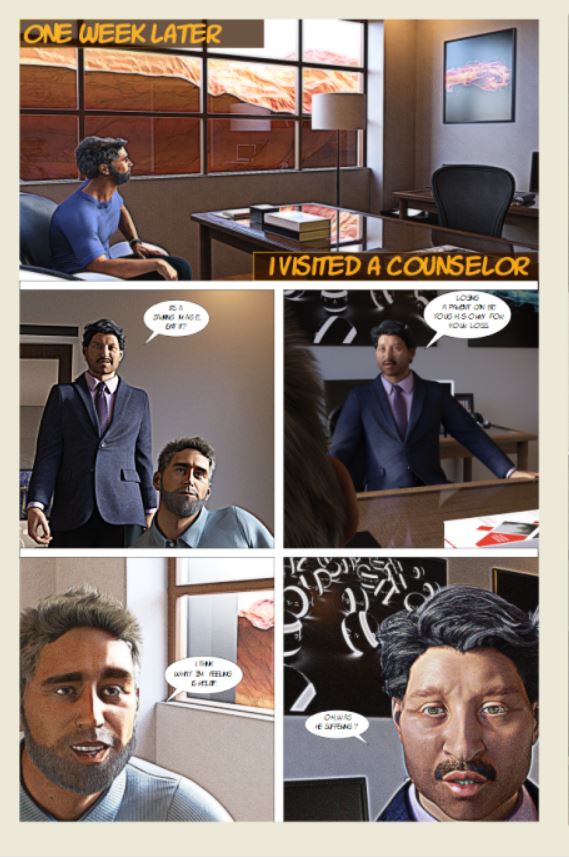
|
|
By Data Juggler - 5 Years Ago
|
I bought a tool for writing called Scrivener that isn't very expensive (compared to IClone it is almost free).
I use it for scene layouts, but it also has text editor with some features more suited for writing than MIcrosoft Word.

And the same company has another great tool called Scrapple that is like $15 that helps you map out relationships between characters and places, etc. I find it really useful when I need to come back to a project and I forgot a lot of the details.
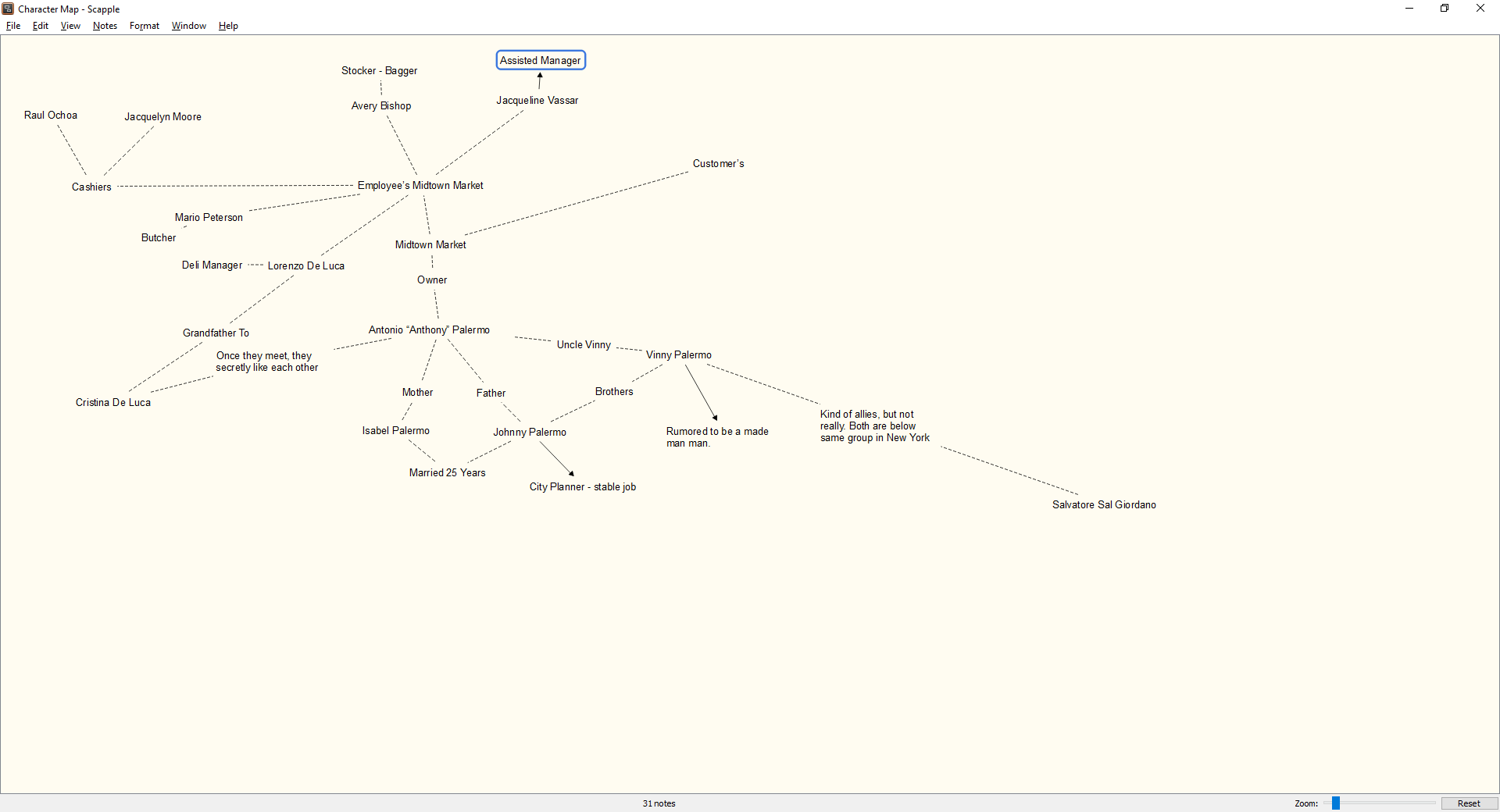
|
|